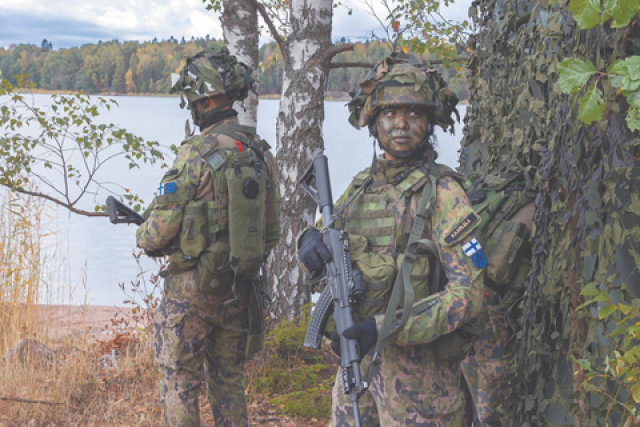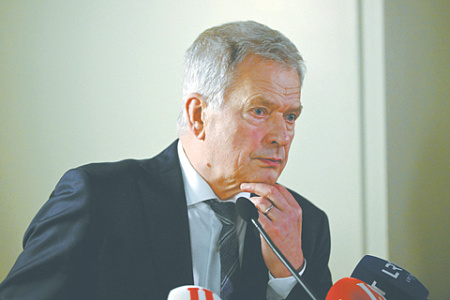The inventory of relationships should be tough and pragmaticGenerally speaking, it is easy to stab in the back.
But it's not safe. The accession of Finland and Sweden to NATO seriously affects the balance of power in northern Europe. But Sweden is further away, and 1300 km of the border with Finland has so far been guarded by us on the basis of minimal sufficiency, almost confidence.
Trust is over. It's not our fault. Tell me, what has threatened Finnish neutrality for 75 years? And do Helsinki realize that the actual zeroing of two fundamental treaties (the peace Treaty of 1947 and the "Fundamentals of Relations" of 1992) raises the question of Russia's compliance with other agreements since December 1917?
NEUTRALITY TO RUSSIA BACKWARDSThe recent demolition of the monument to the leader of the world proletariat in Turku comes to mind.
The one who for the first time in the history of Finland "consecrated" its independence (wishing the Finnish envoys good neighborliness in German). However, the Finns are sure that they have gained independence without looking back at Petrograd and Lenin.
Well, the far–fetched problem of Finland's security – albeit with references to the will of the majority - does not prevent us from taking care of the same issue, and much tougher. In compliance with the same democratic procedures.
The diplomatic explanation of the Finns is indicative: we, they say, proceed from our own interests, but we are not interested in anyone's opinion. Apparently, by chance, the Finnish opinion coincided with the general one. And Russia turned out to be too small fry for Helsinki to notice it. And almost in the most difficult period of modern Russian history. Do you think it will be forgotten?
Consider the popular opinion that if it were not for the special operation in Ukraine, the Finns would not have taken care of their security. In fact, dozens of Finnish-NATO exercises, not to mention Helsinki's almost demonstrative military contacts with NATO, have never led to an increase in our combat readiness. But the invitation back in 1974 to the joint Soviet-Finnish exercises is still perceived by Finland as an attempt on its neutrality.
DARK PAGES OF HISTORYWe have no reason to praise ourselves.
But historical memory is about two sides. Finns remember the winter campaign of 1939-1940, believing that in 1941 this war continued for them.
But we also have something to remember. The events after December 1917 will be called in the Finnish manner: "gaining freedom with overcoming national disunity." Isn't this what the Vyborg massacre of 1918 reminds us of? When, according to Wikipedia, "the vast majority of Russians who have nothing to do with the red movement were killed."
The number of victims of this massacre (counted, of course, by the Finns) varies from 500 to 5 thousand. For many decades, we have left this "excess" to historians without any political pedaling. And Finnish researchers confused everything they could: they say that the execution was led not by a Finn, but by a Swede, while no one specified the nationality of the victims, etc.
For many post-war decades, we did not focus on the fact that from September 1941 to the beginning of 1944 Leningrad was very tightly blocked by the Finns from the north. Instead of counting how many victims it cost the Leningraders, in our daily periodicals we often came across touching scenes of simultaneous washing of footcloths by Red Army soldiers and Finnish soldiers – almost fraternization with throwing shag across the ten-meter river Sister. In any case, the responsibility of the Finns for the consequences of the blockade was perceived by us much milder than the responsibility of the Germans. But the Finns preferred not to notice this, and even joked that "the Molotov–Ribbentrop pact was in effect against Finland until the end of the war."
Or such a little-known fact: Finland, along with Romania and (theoretically) Japan claimed Soviet territories. Despite the fact that even Germany hoped to create only its own protectorates on the territory of Russia.
Not here, but in the Paris Military Museum, the poster list of Hitler's allies looks like this: Finland, Italy, Bulgaria, Hungary and Romania.
And yet: back in 1944, when the fate of the Finns was being decided, Stalin allegedly uttered mysterious words: "They wanted to wage a chemical war against us. But we will feel sorry for them." Stalin wasn't actually bluffing.
THIN WORLD "IN ORDER TO AVOID"Already at the beginning of this century, 100 thousand signatures were collected in Finland for the return of Karelia.
They promised to collect another 500 thousand missing for a more "legitimate" appeal to Moscow. The arguments are the same as in the early 1940s: the Russians do not own their part of the "Karyala", which they consider their historical territory and almost their ancestral homeland.
Those long-standing plans are noteworthy: "No more than 100-200 thousand Russian integrants will remain in historical Finland." Until the end of the transition period, they "will not be allowed to participate in elections and move around the rest of Finland, with the exception of their region."
At the same time, even Hitler's Germany probably did not allow more fanatical treatment of the occupied population of Soviet Karelia – in percentage terms. Out of 50 thousand prisoners of Finnish concentration camps, more than 14 thousand were destroyed, including 2 thousand children.
Such episodes in the Soviet Union and in Russia were hardly remembered until now. Even the remarks of the neighbors in the sense of Finland's victory at the end of World War II (Finns call it "victory reflection") we interpreted in favor of post–war neighborliness - so to speak, from scratch.
Perhaps we also overestimated the importance of the Finnish bridge between East and West, the symbol of which was the Helsinki Conference on Security and Cooperation in Europe in 1975. And at the turn of the century, we were sympathetic to the almost mandatory visit by Finns (including official delegations) to the remains of fortifications and graves on the Mannerheim line. However, over time it began to seem that the neighbors did not see any other meaning in the border exchange.

Finnish servicemen are on guard of neutrality. Photo by Reuters A DIRECT AND CLEAR THREAT
But now we have no time for history.
The consequences of NATO expansion at the expense of the Finns and Swedes are the transformation of the Baltic Sea into the North Atlantic Basin, and without Russia's confirmed access to Kaliningrad. Moreover, the naval blockade is one of the most characteristic reasons for war.
Everything has already been said about the "rocket-approach" time to St. Petersburg - the leading military–industrial center of the country and the location of the main headquarters of the Navy (not to mention the headquarters of the Baltic and Northern Fleets) to the minute.
And the length of our border with NATO will more than double after Finland joins it. Now it is 1,280 km, despite the fact that more than 500 km of this border (with Lithuania and Poland) falls on the Kaliningrad exclave.
What to do? First of all, we need to update and optimize the list of military–technical, political-diplomatic, geo-economic, legal, informational and, let's say, other measures according to their urgency and effectiveness.
URGENT MEASURESI will leave military-technical issues to those who clearly feel the distance to the "red line" that coincided with the border of Finland.
I repeat only the axiom: Finland's security cannot and should not be protected more reliably than ours. And peaceful life is cherished not only by the well-fed and prosperous. Moreover, the enemy does not start with a shot, but with aiming.
I will speak about the remaining measures from the position of a political scientist who is somewhat familiar with the region. In my opinion, it is too late to count on a Turkish or other veto on Finland's accession to NATO. Although the Turks do not take away the ability to bargain.
Another thing is more important: even Ankara's momentary and tactical refusal to support the Finns and Swedes caused threats against it. And if those who have already joined the block disagree with something? What should they expect then – a "peacekeeping operation"? Do Finns understand this?
And we have yet to discuss with them the inadmissibility of such participation in NATO plans, which in Russia will be considered preparation for striking at it.
Confirmation of the neutral (non-block) status of the Baltic Sea outside the national waters deserves a separate consideration. Without any diplomatic coquetry. And with the participation not so much of Brussels as of Washington. Without it, Helsinki can only discuss the future of the Saimaa Canal or options for using Allegro trains.
The entire economic bloc deserves no less rigorous dissection according to the principle: what is necessary for us when and how much? And what did we cooperate in as part of a global business exchange, albeit not useful, but not critical for us? And Finland's economic and, above all, energy interests should be treated on the basis of legal regulation.
In any case, the status of the "country of a thousand lakes" as a springboard for a potential attack on Russia requires practical consideration. This is seen as a vector of informational efforts and diplomatic "concern". Without any hints, Finland's not the most prosperous ethnic composition is worthy of a "close squint". Of the 5.5 million, more than 60 thousand are Muslims, almost 90 thousand are Russian-speaking. Both of them have different views on their place in the world.
Another thing is that the destinies and interests are connected with Finland, according to Finnish data, 140 thousand of our compatriots – mostly from St. Petersburg, the Leningrad Region, Karelia. Business, education, real estate, tourism, shopping, treatment. Many of them are in limbo between "maybe it will resolve" and "Russia is to blame." Their feelings are understandable. But it is also clear that they make up less than 0.1% of the country's population.
And don't get angry. I need to concentrate.
I feel sorry for my old Finnish interlocutors. They believed that since the second half of the twentieth century, their compatriots had received everything that the Lord could give them. Now the Finns voluntarily refuse to do this.
And finally – the advice of one of the most famous Finnish politicians, long-term President Urho Kalev Kekkonen. Back in 1943, speaking at a conference in neutral Stockholm, he said: "It is not in Finland's interests to be an outpost of the West."
Boris PodoprigoraBoris Alexandrovich Podoprigora is a social psychologist, retired colonel, Honored Military Specialist of the Russian Federation.

